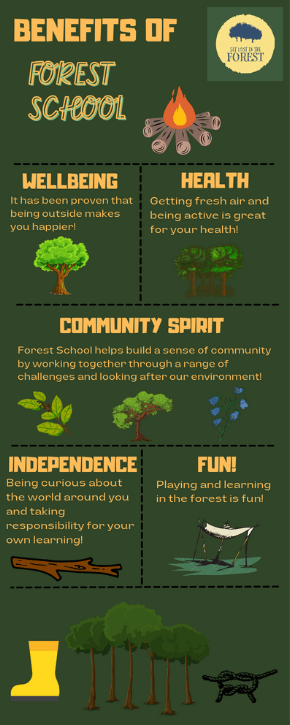Forest School
& OUTDOOR LEARNING
Forest School Lead: Mrs N Bell
What is Forest School?
Forest School is an inspirational concept in which children develop confidence and self-esteem by working in a natural environment.
At Coppice Farm we have a great outdoor space and a dedicated Forest School site in which children have access too, all year round.
INTENT
Our vision and aims for our Forest Schools provision champion and celebrate our values.
Our Forest Schools curriculum fosters unity through collaborative outdoor learning, building strength in character and skills to face challenges confidently. We inspire motivation and a love for learning, encouraging curiosity about the world. By promoting positivity, we create an inclusive atmosphere where every child feels valued, enhancing resilience and creativity for innovative problem-solving.
We intend for Forest Schools provision to develop inquisitive, motivated learners.
Children will gain essential knowledge of environmental awareness, ecosystems, and sustainability, aligning with National Curriculum science objectives. Skills in risk assessment and safety awareness will be developed, enabling responsible navigation of outdoor settings. Our curriculum emphasises practical skills like tool use and shelter building, while enhancing social skills through collaborative activities, aligned with PSHE.
We aim for our Forest Schools provision to foster unity and inspire our pupils.
The Forest Schools curriculum broadens pupils’ horizons, fostering appreciation for local and global ecosystems and enhancing cultural capital. We connect outdoor learning pupils’ lives, promoting personal development through reflection on nature interactions, preparing them for future environmental care.
We plan for our Forest Schools provision to be inclusive, ensuring all children can access our provision and thrive.
Our ambitious curriculum ensures equitable access for all students, including those with SEND and disadvantaged backgrounds. We adapt activities and provide tailored support, maintaining high expectations for meaningful engagement and achievement.
IMPLEMENTATION
Our Forest School and Outdoor sessions build on a child’s innate motivation and positive attitude to learning, offering them the opportunities to take risks, make choices and initiate learning for themselves.
Forest School is about exploring and experiencing the natural world through practical activities. The children go out in all weathers, all year round, exploring and learning from the seasons and environment changes. Appropriate clothing will be worn and during high winds it will be considered unsafe to go into the woods.
The children’s interests along with the varied natural resources in our forest area are used to stimulate creative thinking, problem solving and skill development. One of the principles of Forest School is to promote environmental awareness and encourage sustainability. The children are taught about respect and responsibility for the world around them. Both the children and adults are encouraged to respect their environment and to be aware of conservation issues of the wild area around them.
If appropriate, reclaimed, recycled and sustainable resources will be used to maintain and develop our forest school site. Encouraging children to care for the environment is an essential part of Forest School. In order to encourage the children to look after the site we will always
leave it tidy and never damage anything growing in it. We will only collect things that are on the ground and leave the area as we found it when we leave. The Forest School Leader will monitor the site so that it does not become overused.
IMPACT
The success of Forest School and outdoor learning allows the children to grow in confidence as a result of the freedom, time and space they are given in their learning. This allows them to demonstrate independence at each individual child’s rate. Activities such as sharing tools and participating in play help teach the children to work together as a group, which strengthens their bonds and social skills.
The sensory experiences provided by Forest School helps prompt language development. Improving communication skills has a positive effect on a child’s self-esteem and is a crucial part of their development. High levels of interest lead to high levels of attention. Spending time in the woodland is exciting for a child. It tends to fascinate them which develops a strong will to participate and concentrate over long periods of time. The increase in outdoor activity has a positive physical impact. Not only does the development of physical stamina improve but so do gross and fine motor skills. Children develop an interest in the great outdoors and respect for the environment. Encouraging children to develop a relationship with the natural world will help in protecting the environment for generations to come.
Forest School isn’t just beneficial to children it is also beneficial to teachers - observing their class in a different setting allows them to gain a new perspective and understanding of their class. When children really engage with Forest Schools they will take their experiences home to share with friends and family. Taking children outside of the classroom removes the pressures of academia and allows them to play to their strengths. This is beneficial to children who struggle in the classroom because there is more of an opportunity for them to learn at their own pace.

Having worked alongside with Heather Perry of Get Lost in the Forest for two years, we follow the C's (Consciousness, Control, Catalyst, Community, Compassion, Companionship) and Sarah Blackwell's Growth Cycle (Biology, Boundaries, Belonging, Belief, Brilliance).
As well as building a stronger connection with nature, we also look at the holistic development of children. Because of this, our sessions are child-centred and we consider ourselves 'facilitators' rather than 'teachers'.
Sessions are built around the interests and development of the children rather than aiming towards a particular target - the growth during the process of an experience is the aim, not the outcome. We also use the terminology of 'experience' or 'opportunity' rather than 'activity' to reflect this.
EYFS & KS1 GALLERY
KS2 GALLERY



































